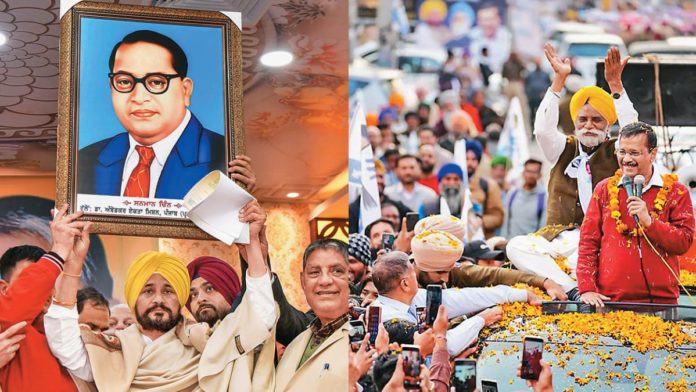All the significant parties in the fray in the Punjab elections this year have made a big show of offering greater representation to Dalits.
The BJP kicked-off this trend last year by announcing it would appoint a Dalit chief minister if elected to power.
The Congress shuffled its chief minister just 111 days before election dates were announced, choosing Dalit leader Charanjit Singh Channi for the post.
The AAP and Shiromani Akali Dal (Badal) have CM faces from the general category, but both were forced to promise a deputy CM from the Dalit community, as it forms the largest vote bank in the state.
These developments have brought Punjab’s caste equations into the national spotlight.
But on the cold winter night of February 15, a conversation with Bikkar Singh, a young Dalit, made it clear to this reporter that although all parties are eager to gain the support of Dalits, they do not want to address the real issues facing the community.
The lip-service has been necessitated simply because they form 33 per cent of the state’s population, and no party can afford to ignore such a huge constituency.
Bikkar Singh says, “The development being offered by all parties is limited to doling out grains and pulses for free, offering handouts of Rs 1,000-2,000 and constructing drains and streets in Dalit neighbourhoods.
Nobody talks of improving our quality of life, our houses and our share in the different means of production in this country.”
Bikkar has been a member of the Zameen Prapti Sangharsh Committee (Land Rights Struggle Committee) for the past three years, waging a struggle to ensure that Dalits of Punjab’s Malwa region get a share in the panchayat lands (village commons).
He had accompanied me to the nearby village of Tolewal so that I could understand the issue of “Dalits’ share in the means of production” as he had described eloquently.
In 2019, Dalits of Tolewal had seized one-third of the village’s panchayat lands.
On the morning of February 14, members of the community gathered in the Ravidas Dharamshala in the village.
There, Dalit farm labourer Ranjit Singh (44) said, “In 1961, the state passed the Punjab Village Common Lands Act, reserving 33 per cent of panchayat common lands for scheduled castes, over which Dalits could bid and get an annual licence.
It has been over 60 years since this law was enacted, but even today in 95 per cent villages, Dalits have not been able to assert their rights on these lands.
Eager-for-votes parties do not utter a single word on this issue. During our long struggle to snatch our rights on this land, we have faced brutality all along.”
Singh points to Maya Devi (56), sitting next to him, and says angrily:
“The heads of these women were split open.”
Maya Devi, also a farm labourer, now speaks up.
“Bhai, so what if we were hit by sticks?
At least by fighting we became owners of land.
Now we can produce fodder for our cattle and enough grains to fulfil our needs.”
This village’s Dalits currently have documented ownership of 5.5 acres of land, which they farm collectively.
Bikkar says:
“Apart from panchayat common lands, there is also the issue of nazul land (unused government land).
In 1956, Dalit farmers were given a part of these lands for agriculture, but today, most of them have been occupied by powerful people.
Despite repeated attempts, Dalit peasants have failed to reclaim these lands.
Even after so many years, they have been denied land ownership, but in this election, no party has promised to ensure these rights for them.”
Across villages of Punjab’s Malwa region, the last 10 years have witnessed numerous movements to claim the land reserved for Dalits, while other hamlets have seen Dalits struggle to claim land to build houses.
Just 3 km from the city of Sangrur, in Kheri village, Dalits have been fighting for many years to take possession of lands they were allotted a decade ago, to build houses.
Darshan, who lives in a single room on a pucca road next to a drain, says:
“Ten years ago, 65 families of our village were assigned plots measuring 5 marlas (around 1,400 sq ft), but we have still not been given possession.
In fact, the markers which were established for our lands have been destroyed.
Both Akalis and Congress have been in power since then, but we have not been offered a resolution.
Dalits of the village are being forced to live on 10-20 yard plots. No political party is ready to speak on this issue.”







